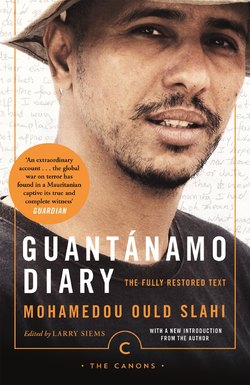Читать книгу Guantánamo Diary - Mohamedou Ould Slahi - Страница 3
Оглавление‘This Guantánamo detainee’s harrowing memoir is a tremendous achievement – and a grave warning against ignoring the rule of law’
Observer
‘This is a necessary book. It reminds us that the evil we’re fighting can be found in ourselves as well as our enemies’
Daily Telegraph
‘A sobering, often chilling, read. Slahi’s story deserves to be widely read’
Independent
‘An extraordinary account . . . the global war on terror has found in a Mauritanian captive its true and complete witness’
Guardian
‘Slahi’s book offers a reminders that the struggles we face in these difficult times involve real individuals, not faceless creatures who are to be characterised as members as one or other hated group. That he has resorted to words, the mightiest of weapons . . . makes his experience all the more relevant today’
Financial Times
‘Mohamedou Ould Slahi’s demand for simple justice should be our call to action. Because what’s at stake in this case is not just the fate of one man who managed, against all odds, to tell his story, but the future of our democracy’
Glenn Greenwald
‘Compelling’
Economist
‘Slahi is an intelligent and sensitive writer whose sense of irony somehow survived along with his sanity’
London Review of Books
‘A kind of dark masterpiece, a sometimes unbearable epic of pain, anguish, and bitter humour . . . The process, which has never been described more intimately or more convincingly, resembles nothing so much as a postmodern globalized version of the Salem witch trials’
New York Times Book Review
‘The big surprise about Slahi’s book . . . is that, in addition to being appalling and sad, it’s funny . . . The diary’s tone is friendly, exasperated, curious, and ironic . . . Slahi doesn’t just humanize himself; he also humanizes his guards and interrogators. That’s not to say that he excuses them. Just the opposite: he presents them as complex individuals who know kindness from cruelty and right from wrong’
New Yorker
‘Necessary reading for those seeking to understand the dangers that Guantanamo’s continued existence poses to Americans in the world . . . a fluent, engaging and at times eloquent writer even in his fourth language of English’
Washington Post
‘Gripping . . . Extraordinary . . . Mr. Slahi emerges from the pages of his diary . . . as a curious and generous personality, observant, witty, and devout, but by no means fanatical . . . Guantánamo Diary forces us to consider why the United States has set aside the cherished idea that a timely trial is the best way to determine who deserves to be in prison’
The New York Times
